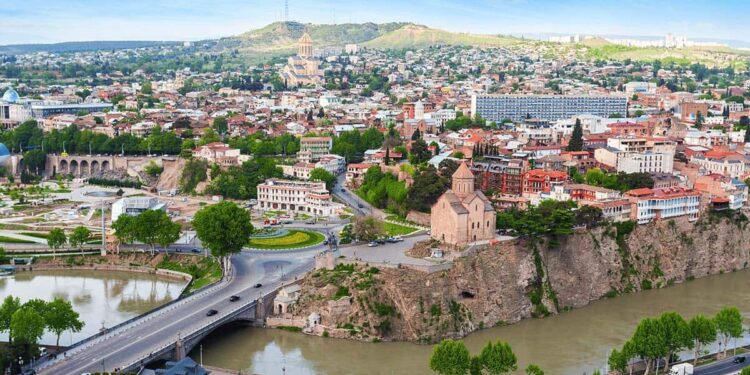Tbilisi remains tense following violent clashes between activists and supporters of the ruling party, escalating political unrest in Georgia’s capital. The confrontation, which erupted amid ongoing demonstrations over controversial government policies, has intensified divisions and raised concerns about stability ahead of upcoming elections. Authorities have responded with heightened security measures as calls for calm and dialogue grow louder from both domestic and international observers. This report from Radio Free Europe/Radio Liberty examines the causes, developments, and potential implications of the recent turmoil shaking Tbilisi.
Tbilisi Streets Turn Tense as Clashes Erupt Between Activists and Ruling Party Supporters
Late evening tensions escalated as city streets witnessed confrontations between opposing groups, marking one of the most volatile episodes in recent Georgian political discourse. Activists advocating for democratic reforms clashed violently with supporters of the ruling party, sparking widespread concern among local residents and international observers. Law enforcement was deployed in large numbers to restore order, resulting in several detentions and multiple reports of minor injuries. The clashes disrupted traffic and forced nearby businesses to close temporarily.
Key issues fueling the unrest include:
- Allegations of electoral fraud and political suppression
- Public frustration over economic challenges
- Calls for transparent governance and accountability
| Incident | Location | Casualties | Police Action |
|---|---|---|---|
| Protest Rally | Rustaveli Avenue | 5 minor injuries | 24 arrests |
| Counter March | Freedom Square | 3 minor injuries | 18 detentions |
Analyzing the Political Fallout and Impact on Georgia’s Stability
The violent confrontation in Tbilisi between activists and supporters of the ruling party has deepened the political divide, casting a long shadow over Georgia’s already fragile democratic fabric. The clashes have reignited tensions between opposition forces and government loyalists, exacerbating mistrust and prompting international observers to voice concerns about the country’s trajectory. The immediate aftermath saw increased security measures and a flurry of rhetoric from key political figures, with accusations flying on both sides regarding provocation and state overreach.
Key consequences emerging from the unrest include:
- Heightened polarization in the Georgian parliament, complicating legislative cooperation.
- Escalated fears of electoral instability ahead of upcoming national elections.
- A surge in civil society mobilization demanding accountability and reforms.
| Factor | Potential Impact | Timeframe |
|---|---|---|
| Political Polarization | Government deadlock and stalled reforms | Short to Medium-term |
| Security Measures | Reduced public protests but risk of human rights scrutiny | Immediate |
| International Attention | Pressure for democratic safeguards and mediation | Medium-term |
Calls for Dialogue and Strengthened Security Measures to Prevent Further Violence
In the wake of the recent violent clashes in Tbilisi, political leaders and civil society organizations have urgently appealed for a renewed spirit of dialogue to bridge the deepening divisions. Prominent figures from both opposition groups and the ruling party emphasized the critical need to foster communication channels that prioritize peaceful conflict resolution. Calls for mutual understanding and respect have grown louder, as many fear that without constructive conversations, tensions may escalate further, undermining the democratic process and social stability.
Simultaneously, experts and public officials have underscored the importance of implementing stringent security measures to prevent any recurrence of violence. Recommendations include increasing police presence in key hotspots, enhancing surveillance, and facilitating rapid response teams to manage any outbreaks swiftly. Below is a summary of proposed security initiatives currently under review:
| Measure | Description |
|---|---|
| Increased Policing | Deployment of additional officers to volatile districts |
| Surveillance Expansion | Installation of more CCTV cameras in public areas |
| Rapid Response Teams | Special units trained for immediate intervention |
| Community Outreach | Engagement programs to ease tensions locally |
- Strengthen law enforcement coordination to ensure prompt and measured responses to incidents.
- Facilitate transparent investigations into previous clashes to build trust among the population.
- Encourage political leaders to publicly condemn violence unequivocally.
Future Outlook
As Tbilisi continues to grapple with the aftermath of recent violent clashes between activists and supporters of the ruling party, the city remains tense and polarized. Authorities face mounting pressure to restore order and address the underlying political grievances fueling the unrest. Observers caution that without meaningful dialogue and reconciliation, the potential for further instability looms large over Georgia’s capital. The coming days will be critical in determining whether Tbilisi can move past this latest chapter of turmoil or if the divisions deepen further.
















